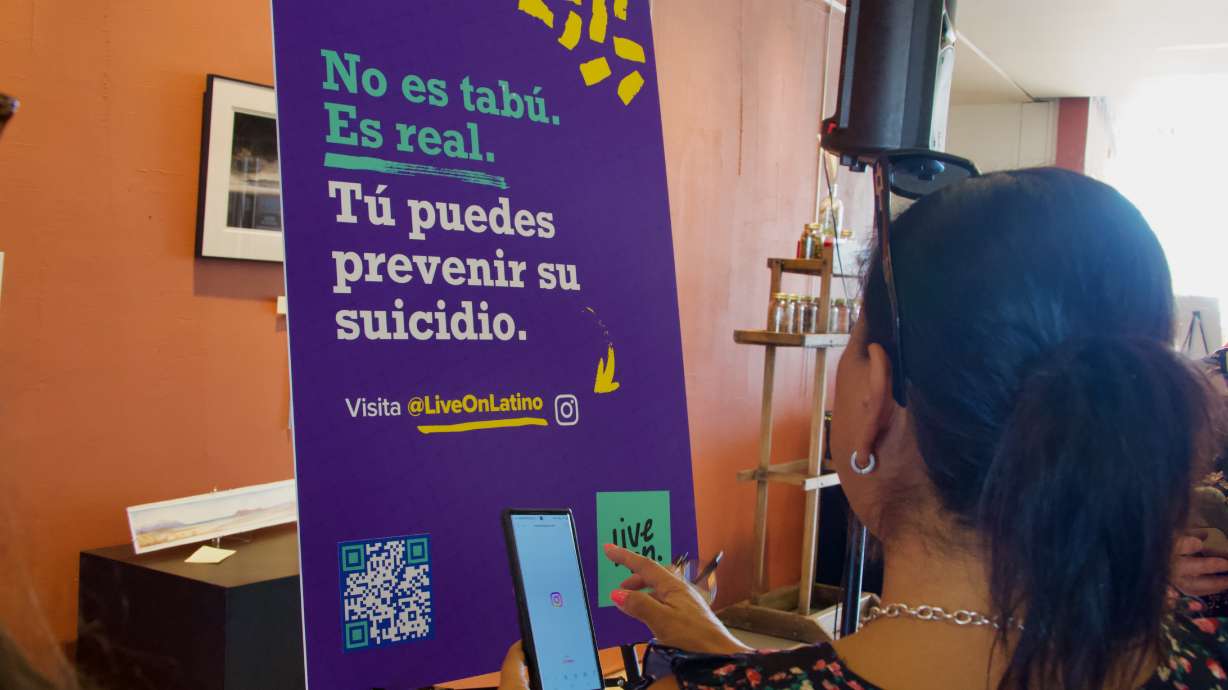Estimated read time: 4-5 minutes
This archived news story is available only for your personal, non-commercial use. Information in the story may be outdated or superseded by additional information. Reading or replaying the story in its archived form does not constitute a republication of the story.
SALT LAKE CITY — Jeannette Villalta has seen the impact of suicide on her community from all sides.
As a suicide survivor, she's gone through dark periods where life didn't seem to be worth living. She also knows the pain of losing a loved one to suicide and how it feels to not know how to help. As a community health worker, she knows resources are available to help — but she also knows that mental health still carries a stigma in the Hispanic and Latino community.
"In a dark moment of life, you believe there is no more life," she said in Spanish. "I know what it's like to be in this dark moment, but I also know what it is to lose someone and the pain we cause when we do this in search of peace. I know that in these moments of total darkness, we do not know how to ask for help because we do not know how to recognize it. And our relatives, despite wanting to, cannot help us either because maybe it is something new for them and they do not have those necessary tools to help a loved one."
She hopes a new Utah suicide prevention campaign in Spanish will help create an environment where mental and emotional health issues are discussed openly and without stigma in the Latino community. That kind of environment, she added, is something that will save lives.
The Live On Latino campaign consists of eight lessons that offer education on suicide and emotional health, including how to find help and how to broach the topics with loved ones. The free video lessons are completely in Spanish and last about 5-7 minutes each.
The campaign is modeled after the state's Live On Playbook, which offers similar resources in English. However, creating Live On Latino went far beyond simply translating the resources into Spanish, said Department of Health and Human Services spokeswoman Luisa Hansen.
Suicide does not discriminate. It does not discriminate culture. It does not discriminate gender, it does not discriminate age, and it can strike at any moment. This is why it's so important that we work together to prevent it and to offer hope to those that feel hopeless.
–Karla Arroyo, Multicultural Counseling Center
Instead, the department worked with community members to craft resources that take things like culture and familial norms in Latino households into account and highlighted mental health providers that specialize in helping Latino and Hispanic clients.
"We knew that the Hispanic community is not in the same place where the majority of the community is here. We knew that the subject has been talked about (in that community) for many, many decades; while in the Hispanic or Latino community, it's a taboo subject," Hansen said. "We needed to go back to the basics."
The campaign adopted the term "emotional health," for example, after getting feedback from community members that the term "mental health" can carry a negative connotation among many in the Hispanic community. Likewise, the first lesson in the campaign, titled "Nuestra Cultura," or "our culture," addresses some of those cultural factors impacting mental and emotional health.
"Our culture has a lot of good things when it comes to supporting us," Live On Latino instructor Hirepan Zarco says in Spanish during the lesson. "But it also has its challenges. Latino culture has a lot to do with appearances. In the case of suicide, this can make it difficult to detect the signs that could allow us to help people who need it. Within the good things of our culture, we find a very close community with strong family ties."
The Spanish resources, unlike the English ones, are available on YouTube and Facebook, in addition to Instagram. Hansen said that request came directly from community members who said it would be easier to listen on YouTube or Facebook while they are at work or busy fulfilling other responsibilities.
Villalta said she's seen Latino families not pay attention to mental health because other things, like putting food on the table, take priority.
"We know our community is a hard-working community," she said, "And many times we don't have enough time to study these topics."
Karla Arroyo, executive director of the Multicultural Counseling Center, stressed the campaign's resources aren't for social workers or mental health providers but for everyone.
"Suicide does not discriminate. It does not discriminate culture. It does not discriminate gender, it does not discriminate age, and it can strike at any moment," she said. "This is why it's so important that we work together to prevent it and to offer hope to those that feel hopeless."
"We must promote the importance of parents talking to their children, teachers talking to their students, friends talking to friends, godparents talking to their parents and kids," Arroyo continued. "We must remind everybody that there is hope and that life is worth living."
Live On Latino resources are available for free on Instagram, YouTube and Facebook.
Suicide prevention resources
If you or someone you know is struggling with thoughts of suicide, call 988 to connect with the 988 Suicide and Crisis Lifeline.
Crisis hotlines
- Huntsman Mental Health Institute Crisis Line: 801-587-3000
- SafeUT Crisis Line: 833-372-3388
- 988 Suicide and Crisis LifeLine at 988
- Trevor Project Hotline for LGBTQ teens: 1-866-488-7386
Online resources
- NAMI Utah: namiut.org
- SafeUT: safeut.org
- Live On Utah: liveonutah.org
- Suicide Prevention Lifeline: www.suicidepreventionlifeline.org
- American Foundation for Suicide Prevention, Utah chapter: afsp.org/chapter/utah









